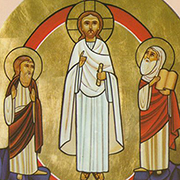Carmelite homily for Wednesday, March 18, 2020 – Lectionary 239 (Matthew 5:17-19
There’s a well-known incident in the life of Saint Teresa of Avila where she’s at dinner, and enjoying dinner, and one of the nuns looks at her unapprovingly because she’s obviously enjoying dinner so much she mustn’t be a holy woman. And Teresa says, “When I pray I pray, and when I partridge I partridge .” That was the menu that day. We can get so caught up in the externals we miss the deeper things. Saint Teresa of Avila says, “Being a friar doesn’t consist in the habit – I mean wearing it – but in enjoying the state of higher perfection, which is what it means to be a true friar.” That’s what she’s calling us to. And what today’s Gospel is calling us to. To being more than just fussing with the letter of the Law but allowing that Law to change our inside, to transform us in love, to be deeper, richer, truer, more mature people. That’s the call of today’s Gospel.






